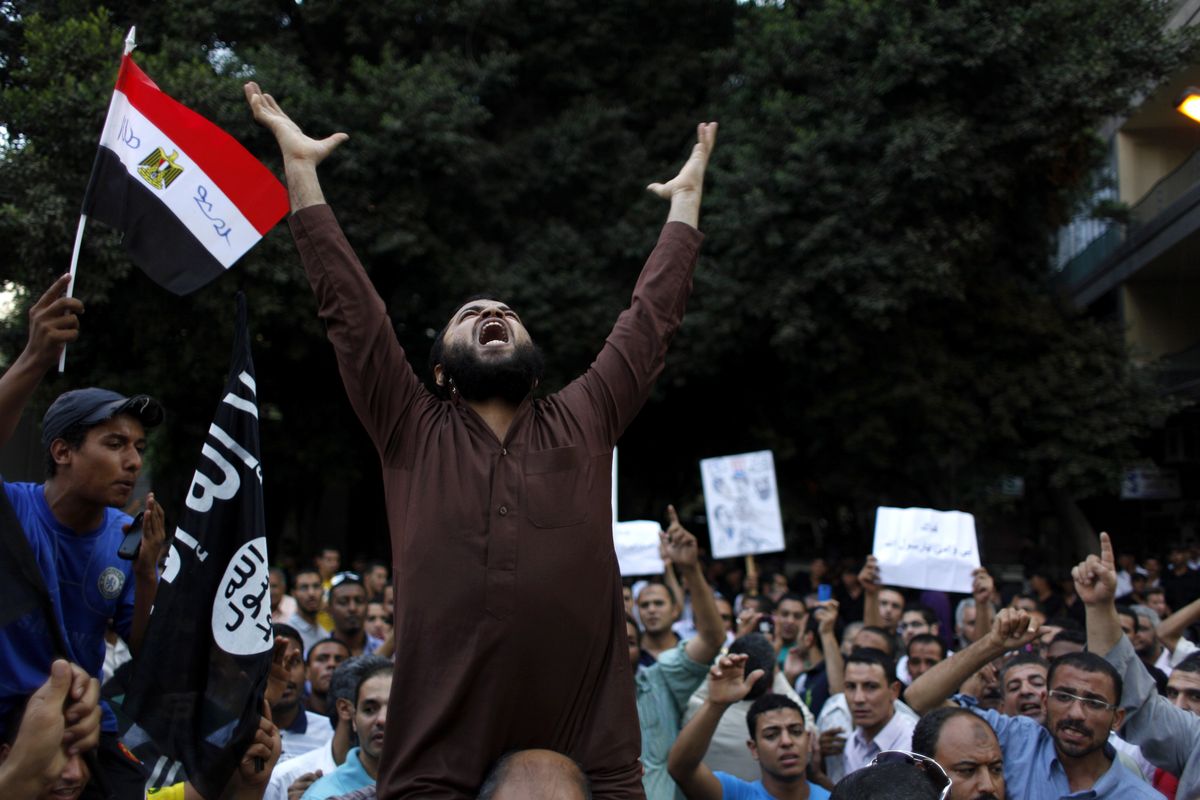U.S. vows justice in killings at Consulate
Attack believed to be carefully planned

CAIRO – The attack on a U.S. diplomatic post in eastern Libya that killed the U.S. ambassador and three other Americans was carried out by a small group of militants who arrived late at night, unleashed a fusillade from AK-47 rifles and rocket-propelled grenades, then torched and ransacked the building, according to witnesses and U.S. officials.
U.S. officials said the two-hour assault on the U.S. Consulate in Benghazi appeared planned and “complex,” rather than a spontaneous outbreak of mob violence in reaction to an online video, purportedly produced in the United States, that mocks the Muslim Prophet Muhammad. The video had prompted protesters to scale the U.S. Embassy walls in Cairo earlier Tuesday and tear down an American flag.
President Barack Obama vowed to work with Libyan officials “to bring to justice the killers,” and ordered security beefed up at U.S. diplomatic missions around the world.
The Pentagon sent about 50 Marines from Spain to help guard the embassy in Tripoli, the Libyan capital.
The Pentagon is also moving two warships toward the Libyan coast to give commanders flexibility to respond to any mission ordered by the president.
The dead included J. Christopher Stevens, 52, the first U.S. ambassador killed in the line of duty since 1979, and Sean Smith, a State Department information officer and Air Force veteran. The identities of the other two slain Americans were being withheld pending notification of their families, officials said.
For the Obama administration, the assault cast a shadow over its support of the “Arab Spring” uprising that overthrew Libyan strongman Moammar Gadhafi in August 2011.
Fledgling democracies across the region are struggling to tame dangerous political rivalries and manage movements that have long been suspicious of the West. A new, democratically elected government in Tripoli has sought to exert authority over Libya’s scarred, tribalistic society.
The image of the burned consulate was a sharp contrast to scenes of euphoria in Benghazi, the cradle of the revolt against Gadhafi, when NATO intervened last year. Then, outdoor prayer services were often decorated with the flags of the U.S. and other NATO countries.
Since then, however, the rivalry between eastern and western Libya has intensified. And Islamist militants long suppressed by Gadhafi, especially in Benghazi and other parts of eastern Libya, have reportedly grown in influence.
Libya’s parliamentary elections in July were largely peaceful, and the Muslim Brotherhood finished a distant second in the balloting. But analysts have warned that radical Islamist groups have been looking to exploit a security vacuum.
Witnesses in Benghazi said a small crowd gathered Tuesday night outside the consulate to protest the anti-Muslim video, which was disseminated online by Morris Sadek, an Egyptian Christian activist in suburban Washington, D.C.
About 10 p.m., Abdel Monem Monem, a former adviser to the leader of the rebels’ transitional government, went to check and found about 50 people demonstrating without violence.
About 11:30 p.m., armed men drove up in about 20 cars bearing Islamic slogans. Sheik Mohamed Oraibi, a young Islamic preacher of the hard-line Salafist movement who was involved in the peaceful protest, watched as what he called “religious extremists” armed with Kalashnikov assault rifles and rocket-propelled grenades arrived and began firing at the consulate. He said he didn’t believe they were affiliated with al-Qaida.
The compound’s security guards fired into the air to try to disperse the attackers, but the attackers fired back with “ridiculous amounts of gunshots,” Oraibi said.
Fire gutted the compound, according to U.S. officials, and sent U.S. personnel running for safety.
Senior U.S. officials, briefing reporters in Washington on condition of anonymity, said the assailants breached the security walls and fired their weapons, setting the consulate ablaze.
Stevens, Smith and a security officer were inside the consulate but became separated as they sought to make their way out of the burning building, the officials said. The security officer made it outside but he went back into the consulate to search for the others.
Finding Smith already dead, the officer pulled him from the building. He was unable to locate Stevens “before being driven from the building due to smoke,” the official said.
The annex, with 25 to 30 other staffers inside, was also under attack. The officials said the two other Americans who died were inside the annex and that another two there were wounded.